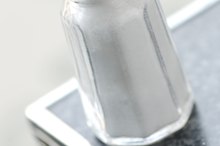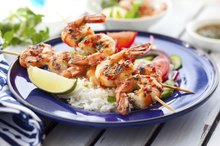Vitamin B12 as a Cause of Gout
While a number of things increase your risk for gout, you do not need to throw out your vitamin B-12 supplement. The confusion lies in the fact that the very foods you need to avoid in a gout diet are the foods that contain vitamin B-12, which is necessary for red blood cell formation, neurologic functions and DNA synthesis 2.
If you are experiencing serious medical symptoms, seek emergency treatment immediately.
Overview of Gout
Gout is an increase of uric acid in your body due to either an overproduction of uric acid or an under-excretion of uric acid by the kidneys. Your body removes uric acid naturally, but if you suffer from gout your body starts to accumulate uric acid. Symptoms are usually painful joints that become red, swollen, hot and intensely painful. The most common joint affected is the big toe. The cause of gout is unknown, but physicians believe it is a combination of genetics, hormones and diet 2.
- Gout is an increase of uric acid in your body due to either an overproduction of uric acid or an under-excretion of uric acid by the kidneys.
- Your body removes uric acid naturally, but if you suffer from gout your body starts to accumulate uric acid.
Risk Factors for Gout
Are Radishes Good for Gout?
Learn More
Even though the cause of gout is unknown, there are several known risk factors. Uric acid is an end product of purine metabolism. Purine is present in many foods, such as:
- meat
- seafood
- asparagus
- mushrooms
- dried beans
- alcohol
- particularly beer
Other risk factors are obesity, male gender, age over 40 years, organ transplants, thyroid problems, and the use of certain medications such as
- diuretics
- aspirin
- levodopa
- cyclosporine
Vitamin B-12 and Gout
If you suffer from gout, you need to minimize your intake of purine-rich foods and beer and increase your intake of water, which helps to eliminate uric acid. Foods high in vitamin B-12 and not antagonistic to gout are fortified cereals, yogurt, milk and cheese.
Conclusions
Gout and Iodine
Learn More
Vitamin B-12 does not cause gout. However, you may not be getting the right amount of vitamin B-12 if you have eliminated meats and seafood from your diet due to gout 2. Be sure to discuss any dietary changes with your physician. You may need to add different foods or supplements to your diet while eliminating others to minimize your gout symptoms and gout attacks 2.
Related Articles
References
- ehealth forum; Gout; September 23, 2009
- National Institutes of Health; Dietary Fact Sheet; Vitamin B-12; May 26, 2010
- "New England Journal of Medicine"; Purine-Rich Foods, Dietary and Protein Intake, and Risk of Gout in Men; Hyon K. Choi, et al; March 11, 2004
- U.S. Department of Health and Human Services and U.S. Department of Agriculture. 2015–2020 Dietary Guidelines for Americans. 8th Edition. Published December 2015.
- U.S. Department of Health and Human Services. Gripped by Gout. NIH News in Health. Published February 2014.
- National Institute of Arthritis and Musculoskeletal and Skin Diseases. Gout. Updated April 2016.
- Zhang Y, Chen C, Choi H, et al. Purine-rich foods intake and recurrent gout attacks. Ann Rheum Dis. 2012; 71(9):1448-53. doi:10.1136/annrheumdis-2011-201215
- Fischer E. Ueber die Harnsauer. 1 [On Uric Acid. 1]. Berichte der Deutschen Chemischen Gesellschaft. 1884: 17:328-338. doi:10.1002/cber.18980310304
- Ragab, G., Elshahaly, M., & Bardin, T. (2017). Gout: An old disease in new perspective – A review. Journal of Advanced Research, 8(5), 495–511. doi:10.1016/j.jare.2017.04.008
- Centers for Disease Control and Prevention. Gout. Updated January 28, 2019.
- Zgaga, L., Theodoratou, E., Kyle, J., Farrington, S. M., Agakov, F., Tenesa, A., … Campbell, H. (2012). The Association of Dietary Intake of Purine-Rich Vegetables, Sugar-Sweetened Beverages and Dairy with Plasma Urate, in a Cross-Sectional Study. PLoS ONE, 7(6), e38123. doi:10.1371/journal.pone.0038123
- Choi HK, Gao X, Curhan G. Vitamin C intake and the risk of gout in men: a prospective study. Arch Intern Med. 2009;169(5):502–507. doi:10.1001/archinternmed.2008.606
- Zhang Y, Neogi T, Chen C, Chaisson C, Hunter DJ, Choi HK. Cherry consumption and decreased risk of recurrent gout attacks. Arthritis Rheum. 2012;64(12):4004–4011. doi:10.1002/art.34677
- Arthritis Foundation. Gout Diet: Dos and Don’ts.
- Boban M, Modun D. Uric acid and antioxidant effects of wine. Croat Med J. 2010;51(1):16–22. doi:10.3325/cmj.2010.51.16
- Caliceti C, Calabria D, Roda A, Cicero AFG. Fructose Intake, Serum Uric Acid, and Cardiometabolic Disorders: A Critical Review. Nutrients. 2017;9(4):395. Published 2017 Apr 18. doi:10.3390/nu9040395
- U.S. Department of Health and Human Services and U.S. Department of Agriculture. 2015–2020 Dietary Guidelines for Americans. 8th Edition. Published December 2015.
- U.S. Department of Health and Human Services. Gripped by Gout. NIH News in Health. Published February 2014.
- Kakutani-Hatayama M, Kadoya M, Okazaki H, et al. Nonpharmacological Management of Gout and Hyperuricemia: Hints for Better Lifestyle. Am J Lifestyle Med. 2015;11(4):321–329. Published 2015 Sep 2. doi:10.1177/1559827615601973
Writer Bio
A medical writer since 2000, Cynthia Borda is the author of "Alzheimer's Disease and Memory Drugs." She holds a Bachelor of Science in pharmacy from the University of Pittsburgh and a doctorate in pharmacy from the University of Colorado, as well as an M.B.A. in health-care management and science administration from Widener University.









